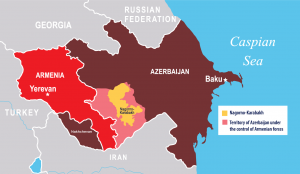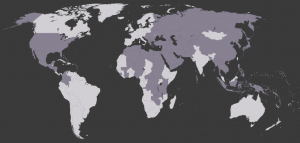Armenian Elections: A Landslide Win for the Opposition
Why It’s Important
 Acting Prime Minister Nikol Pashinyan, who spearheaded Armenia’s April 2018 “Velvet Revolution”, won a landslide election victory and earned a parliamentary supermajority for his My Step bloc.
Acting Prime Minister Nikol Pashinyan, who spearheaded Armenia’s April 2018 “Velvet Revolution”, won a landslide election victory and earned a parliamentary supermajority for his My Step bloc.
Pashinyan’s somewhat controversial public statements on Armenia’s unresolved conflict with Azerbaijan over Nagorno-Karabakh could help foster rapprochement.
Following a vigorous anti-corruption-focused campaign, Pashinyan is poised to confront entrenched interests and dynamics that have stymied Armenia’s economic development.
A Resounding Win for Nikol Pashinyan’s My Step Bloc
Armenia’s recent snap parliamentary elections jettisoned the longtime ruling party from Parliament and propelled maverick journalist-turned-politician and acting Prime Minister Nikol Pashinyan’s My Step bloc to a super majority. Pashinyan vigorously campaigned on tackling corruption and offered somewhat controversial views on Armenia’s three-decade conflict with Azerbaijan. This has upended politics in Armenia, and the election results may have significant domestic and regional implications.
In an important break from the past, My Step secured a decisive win in an electoral process deemed by international observers as a “genuine competition” conducted with “broad public trust”. Together with the like-minded Bright Armenia bloc, which won six percent of the vote, My Step will have a two-thirds share of 123 seats, effectively holding a supermajority in the new Parliament. In contrast, the former ruling Republican Party will not be represented at all; it tallied only 4.5 percent, below the five percent threshold required by Armenian law to claim parliamentary seats. Its former coalition partner, Prosperous Armenia, led by a wealthy, former arm-wrestling world champion, also fared poorly with just eight percent of the vote.
Obstacles to Economic Recovery
Pashinyan, who spearheaded Armenia’s April 2018 “Velvet Revolution” and was subsequently elected by Parliament to serve as acting Prime Minister until elections could be held, is expected to prioritize the country’s notorious levels of graft. His campaign focused on tackling corruption, a major factor contributing to the poor state of an economy where key stakeholders — including from the former government — allegedly exercised near monopolies over the import of basic goods like flour, gasoline and sugar. This has contributed to severe economic malaise and fueled large-scale emigration to Russia and beyond.
Yet the country’s economic recovery and development does not rest solely on its ability to tackle corruption. The unresolved conflict with Azerbaijan shut down vital economic corridors and remains a key factor; Turkey closed its border when conflict erupted in 1993, and Iran’s remote border frontier lacks adequate infrastructure, with not even a single railway. This has left Armenia with only Georgia — and its poor transportation links — as an import-export conduit. The resulting status quo allows for monopolistic trade arrangements to flourish and an economy dependent on corrupt syndicates.
Relations with Moscow
Armenia’s formal political ties to Russia remain strong and are unlikely to change much anytime soon. Even though Yerevan supplies small contingents to the NATO-led operations in Afghanistan and Kosovo, Pashinyan has stated that he will not pursue NATO membership. Armenia also remains a member of the Russian-led Collective Security Treaty Organization (CSTO) and Eurasian Economic Union (EEU), a political and economic union designed by Moscow to serve as counterweights to NATO and the EU, respectively. Yet Pashinyan’s statement on NATO could also be understood as a tactical move to avoid trouble with Moscow, which is a longtime supplier of arms to both Armenia and Azerbaijan.
Pashinyan and the Nagorno-Karabakh Conflict
The longstanding and unresolved conflict with Azerbaijan over Nagorno-Karabakh featured prominently in the electoral campaign. Many viewed Pashinyan’s public statements as somewhat controversial and his expression of discontent with influential Karabakh figures was new for its openness. Pashinyan has clashed openly with the “Karabakh Clan”, a nationalist contingent with roots in the region and outsized policy influence regarding peace talks. The Prime Minister also has a close relationship with Armenia’s reclusive first President, Levon Ter-Petrosyan, whose 1998 resignation was due in part to advocating for broad concessions to Azerbaijan. Their connection is understood as an indication of Pashinyan’s conciliatory inclinations.
But there has been a dearth of concrete proposals and Pashinyan’s prospective negotiating stance is hard to discern. A conciliatory position would likely pit him against nationalist figures opposed to concessions, which could include relinquishing parts — or all — of the Azerbaijani districts bordering the mainly ethnic Armenian region of Nagorno-Karabakh. Occupied by Armenian forces since 1993-1994 as a so-called “security zone”, these districts were once home to an estimated 600,000 ethnic Azeris. Today, however, they are little more than a depopulated wasteland of ghost-cities and looted villages.
Azerbaijan’s Response
Azerbaijan’s state-dominated media has heaped scorn on Pashinyan, strongly hinting that he is a nationalist novice. But behind public derision that seems intended for a domestic audience, messaging from key Azeri officials has been more encouraging. Foreign Minister Eldar Mammadaryov has said that he has been encouraged by recent contacts with Armenian counterparts and claimed that a breakthrough could come in 2019. Pashinyan’s brief encounters with Azeri President Ilham Aliyev, whom he has met on the sidelines of recent multilateral events, are more difficult to ascertain.
Despite dramatic political changes in Armenia, the ceasefire in place since 1994 has largely held since Pashinyan assumed de facto power several months ago, with a downtick in ceasefire violations. This may be a sign of war fatigue and a wait-and-see attitude that could help lead to meaningful rapprochement, but vested interests and significant obstacles to progress remain.

